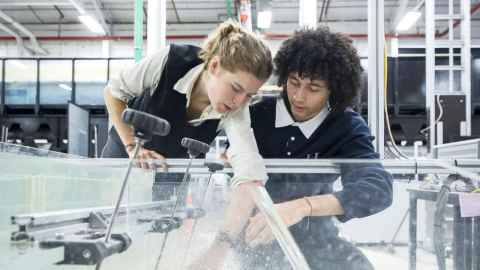Julia Ford and Iisa Salie
As climate change intensifies the impact of flooding, Julia Ford and Iisa Salie are combining engineering with indigenous knowledge to help the Wairoa district strengthen its flood resilience – leading to safer and more prepared communities.
Programme: Bachelor of Engineering (Honours)
Specialisation: Civil Engineering
Final Year Project: Building flood resillience in Wairoa using scientific data, flood modelling, and Mātauranga Māori (Māori knowledge).
Excelling in maths and physics in high school, these subjects opened the doors to the world of Engineering for Julia Ford and Iisa Salie. A visit to the University of Auckland campus helped cement Julia’s decision – she was drawn to the hands-on nature of the programme and the opportunity to explore real-world applications through state-of-the-art facilities.
Now, for their Final Year Project, Julia and Iisa are tackling one of the most pressing challenges of our time – the growing impact of flooding in the face of climate change. The pair are working to reduce the impact of floods in the Wairoa district through scientific data, Mātauranga Māori (Māori knowledge), and community values. This project gives students the opportunity to apply their knowledge in a real-world context – preparing them to solve complex problems in their future careers.

Could you tell us about your Final Year Project and what inspired it?
"We intend on improving flooding models to better represent communities and we acknowledge that they have capability. We want to develop their resilience by making it more specific," Julia says.
"Wairoa has faced a lot of significant flooding in the past and a lot of the infrastructure is aged."
"We decided to focus on Wairoa as it wasn't receiving some of the resources it needed to develop resilience in the face of climate change and increased flooding risk," Iisa adds, who is studying a Bachelor of Global Studies in Sustainable Development and Māori Studies, alongside his Bachelor of Engineering (Honours) degree.
“In this project, we have been developing scenarios based on the river network and Wairoa's history to gain a better insight into the behaviour of the catchment and culturally significant areas and practices that should be preserved."
“This project combines areas of expertise from both of my degrees and presents me an opportunity to collaborate with community members to achieve the best outcome possible."
“Before our visit to Wairoa, we had a solid understanding of the river system, but only from a purely technical viewpoint."
“We had very limited insight towards the history and mana of the area itself; a lot of the Mātauranga is not easily accessible online and was something we only truly learnt once we were with the community during our visit."
We believe that by incorporating Indigenous knowledge via conducting wānanga (workshops) with local Iwi, we can gather insights and truly understand what the stakeholders want from a flooding model to develop their resilience from their perspective.
What are some of your key takeaways from working on this project?
"Our project has had a very large collaboration component with the iwi of Wairoa. This has been by far the most enjoyable aspect of our project because it puts all of our work into perspective," Iisa says.
"We could speak with locals who experienced significant losses throughout the recent flooding events in the region and better understand why there needs to be a lot more research done to explore how to adapt flood modelling for rural communities."
"Working directly with the community that may benefit from your research is extremely rewarding."
"Even though it may be daunting, signing up for a four-year degree, when you graduate, you're employable and valued around the world," Julia says.
"If you're considering it, just go for it. Honestly, there's enough variety for you to find what you're passionate about, and you’ll make relationships that will last a lifetime."
Find out more about the programme structure, entry requirements, fees, and key dates for the Bachelor of Engineering (Honours).